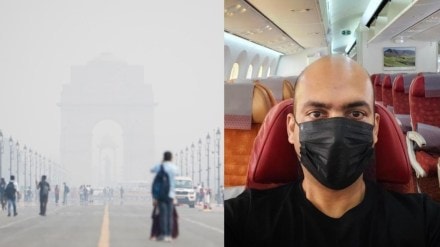Delhi’s hazardous air quality continues to take a toll on residents and visitors alike. The thick blanket of smog over the city has made burning eyes, persistent coughing, headaches, among other things disturbingly common. Among those affected during a recent visit was former Xiaomi India head and current G42 CEO Manu Kumar Jain, who said the city’s toxic smog overwhelmed him within hours of landing.
Jain, who had arrived in Delhi for some meetings, shared a photo of himself aboard his return flight wearing a mask. Writing on X, he said he had forgotten to carry an N95 mask, a mistake he instantly regretted. “Within a few hours my eyes were watering, throat was burning, I kept coughing and even had a mild headache,” he wrote. Jain added that the experience reminded him of just how “out of practice” he had become with the NCR’s pollution levels.
Feels personal to Jain
For Jain, the emotional weight of the experience was heavier than the physical discomfort. Having studied at IIT Delhi, he called the region home. “This hits harder personally because I grew up near Delhi NCR (Meerut) and studied in IIT Delhi. I love this place – its energy, people, food, and so much more,” he said. But the smog forced him to cut short his visit and take an earlier flight out.
“I am not blaming anyone,” he added, calling Delhi’s air crisis a collective failure. “But I sincerely hope we can turn this around and make a real change for our kids – so that they can grow up breathing cleaner air,” Jain X post further read.
Was in #Delhi for a day for some important meetings, and realised how out of practice I am with the air pollution here. Within a few hours my eyes were watering, throat was burning, I kept coughing and even had a mild headache (I forgot my N95 mask, and hence the impact was even… pic.twitter.com/GTzszgRMEH
— Manu Kumar Jain (@manukumarjain) November 20, 2025
CAQM revises GRAP in Delhi
Jain’s experience is common for all across the national capital, where air quality has deteriorated sharply in recent weeks. Following strong observations by the Supreme Court this week, the Commission for Air Quality Management (CAQM) tightened Delhi-NCR’s pollution-response framework on Friday.
Graded Response Action Plan (GRAP) outlines escalating measures to combat pollution as AQI levels worsen. Delhi is currently under stage three. Under this, strict curbs such as a ban on non-essential construction and demolition and staggered working hours for government and municipal offices, comes into effect.
Following SC hearings on November 17 and 19, the CAQM formally revised the GRAP schedule, advancing several measures to earlier stages to prevent further deterioration. This means interventions like staggered office timings, increased public transport frequency and even advisories on work-from-home will now kick in at lower pollution thresholds than before.
The order dated November 21 stated that the Commission acted after the court urged “proactive measures” to arrest rising pollution. CAQM officials held consultations with multiple departments on November 20 before finalising the changes.
